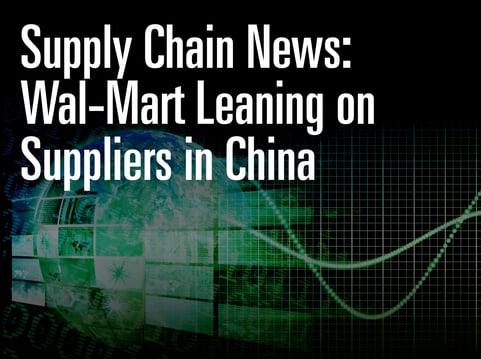
In 2015, China devalued the Yuan nearly 2% hoping to stimulate growth and exports. This year, the currency is down 2.9 percent versus the dollar. Purchasers of Chinese exports are enjoying lower net prices when buying in dollars.
This financial windfall may be short lived for suppliers. Wal-Mart is pressuring China-based suppliers for price concessions equal to, or greater than, the currency devaluation. Wal-Mart representatives have notified more than 10,000 suppliers with manufacturing facilities in China that they are seeking cost cuts of 2% - 6%. This comes on the heels of a prior cost reduction effort at the expense of Wal-Mart suppliers in June, which added usage fees and altered vendor payment agreements to reflect inventory turnover times.
The company is telling suppliers that they should pass on the savings arising from the Yuan devaluation so Wal-Mart can continue to guarantee "Low Prices Every Day.” Wal-Mart has yet to confirm the cost reduction requests, but suppliers, who are anonymous for fear of losing Wal-Mart business, have confirmed it. Most suppliers will have little choice but to negotiate some level of compliance. If the Yuan should gain back some of its value, those same suppliers may have a difficult time renegotiating the ground they are giving up. Wal-Mart is not alone in its cost cutting quest. Toys-R-Us and Home Depot have announced similar talks with China-based suppliers.
Labor Troubles
Wal-Mart's cost cutting efforts are the result of labor relations, falling stock value and e-commerce investment. The retail giant is raising the starting wages for more than 100,000 of its U.S. workers, including for managers of some departments and for workers in certain specialized areas. The starting salary for workers was raised to $9 an hour in April, and will increase to $10 sometime in 2016. This increase will add to employee related payroll expense for 500,000 of the company’s 1.3 million U.S. employees. Managers of more technical, knowledge demanding departments, such as electronics and automotive, will enjoy commensurately higher increases.
Stock Troubles
Wal-Mart stock price has taken a significant hit this year. In January 2015, stocks were at a high of just over $90 per share and have since plummeted to a low of $64 per share today.
Wal-Mart stock seems like it’s one of the most conservative investments in the stock market today. Revenue and earnings are expected to remain steady for the foreseeable future, and steady earnings have funded rising dividends over the last 40 years. There is a seriously expensive potential liability lurking within the financial statements regarding reporting and revenue classification. Wal-Mart is using international tax havens to hide $76 billion in overseas assets. Here are the details of the claim according to investorplace.com:
- Wal-Mart has 78 subsidiaries and $76 billion in assets in overseas tax havens.
- None of the countries where these subsidiaries exist even have Wal-Mart stores. In 2014, Wal-Mart borrowed $2.4 billion from its own overseas subsidiaries via short-term, low-interest loans that avoid the 35% repatriation taxes; a practice that may be illegal.
- Wal-Mart failed to disclose these 78 subsidiaries in Exhibit 21 of its 10-K, a transgression that’s against SEC rules.
- The report calls on both the SEC and IRS to investigate Wal-Mart. You’d better believe the IRS would take more than a cursory look at these allegations considering the Obama administration is cracking down on corporate tax avoidance.
While published by Americans for Tax Fairness, the research behind the report itself was actually conducted by the United Food & Commercial Workers International Union, a politically active group that lobbies for better treatment of workers in the industry.
E-Commerce Investment
Through all of this, Wal-Mart continues its commitment to e-commerce. They are also heavily invested in new distribution facilities in strategic geographical areas capable of delivering online orders within two days anywhere in the United States. Investments in e-commerce and logistics will likely have a negative effect on earnings per share in the near future. Growing pains are simply necessary to stay competitive in the online retail market.
For more Supply Chain and Logistics news, click the button below.



 Land-Link, a well respected professional organization, has been providing its clients with effective transportation and logistics solutions since 1978.
Land-Link, a well respected professional organization, has been providing its clients with effective transportation and logistics solutions since 1978.

